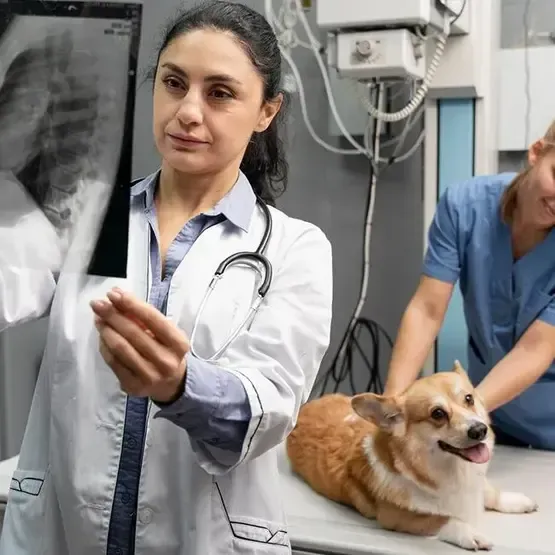Canine Cancer Care in Stockton, CA
Cancer in dogs, like in humans, occurs when abnormal cells grow uncontrollably and form tumors. These tumors can be benign (non-cancerous) or malignant (cancerous). While cancer can affect dogs of all ages and breeds, certain factors can increase the risk, such as genetics, exposure to toxins, and aging.
Common Types of Dog Cancer
Lymphoma: A cancer of the immune system.
Mast Cell Tumor: A tumor that originates from mast cells, which are involved in allergic reactions.
Osteosarcoma: A type of bone cancer.
Hemangiosarcoma: A cancer that affects blood vessels.
Skin Cancer: Can include various types of skin tumors.
Signs and Symptoms of Dog Cancer
Lumps or bumps: These can appear anywhere on the body.
Weight loss: Unexplained weight loss can be a sign of cancer.
Lethargy: A decrease in energy levels.
Loss of appetite: Reduced interest in food.
Difficulty breathing: Can be a sign of lung cancer or other cancers affecting the respiratory system.
Bleeding or discharge: Unusual bleeding or discharge from any body opening.
Changes in bowel or bladder habits: Can indicate cancer affecting the digestive or urinary system.
Diagnosis and Treatment
Veterinary Examination: A thorough physical examination, including palpation of any lumps or bumps.
Diagnostic Tests: Blood tests, urine tests, X-rays, ultrasounds, and biopsies to confirm a diagnosis.
Treatment Options
Surgery: Removal of the tumor and surrounding tissue.
Chemotherapy: Using drugs to kill cancer cells.
Radiation Therapy: Using high-energy radiation to kill cancer cells.
Immunotherapy: Stimulating the immune system to fight cancer cells.
Targeted Therapy: Using drugs to target specific molecules involved in cancer growth.
Preventing Dog Cancer
While there's no guaranteed way to prevent dog cancer, these steps can help reduce the risk:
Regular Veterinary Check-ups: Early detection is key to successful treatment.
Healthy Diet: A balanced diet can help boost your dog's immune system.
Avoid Toxins: Keep your dog away from pesticides, herbicides, and other harmful chemicals.
Limit Sun Exposure: Excessive sun exposure can increase the risk of skin cancer.
Consider Spaying or Neutering: This can reduce the risk of certain types of cancer.

Testimonial
What They Say

Was looking for a new Vet near me in Stockton and very happy with Walker Vet Hospital! Customer service, informative, and compassionate with staff and doctors. Give a 10 out of 10. Taking all three of my dogs there happily.


Rae W.

Good value and knowledgeable. No waiting most of the time. Always 2-3 doctors at a time and weekend care available which is appreciated. All of our three dogs been going to Walker Vet in Stockton for some time now. Never any complaints.


Nick G.

Review Us!
Visit our Google review page to share your feedback

Review Us!




